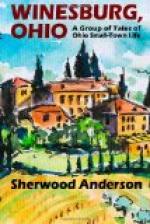One of the worst fates that can befall a writer is that of self-imitation: the effort later in life, often desperate, to recapture the tones and themes of youthful beginnings. Something of the sort happened with Anderson’s later writings. Most critics and readers grew impatient with the work he did after, say, 1927 or 1928; they felt he was constantly repeating his gestures of emotional “groping”—what he had called in Winesburg, Ohio the “indefinable hunger” that prods and torments people. It became the critical fashion to see Anderson’s “gropings” as a sign of delayed adolescence, a failure to develop as a writer. Once he wrote a chilling reply to those who dismissed him in this way: “I don’t think it matters much, all this calling a man a muddler, a groper, etc.... The very man who throws such words as these knows in his heart that he is also facing a wall.” This remark seems to me both dignified and strong, yet it must be admitted that there was some justice in the negative responses to his later work. For what characterized it was not so much “groping” as the imitation of “groping,” the self-caricature of a writer who feels driven back upon an earlier self that is, alas, no longer available.
But Winesburg, Ohio remains a vital work, fresh and authentic. Most of its stories are composed in a minor key, a tone of subdued pathos—pathos marking both the nature and limit of Anderson’s talent. (He spoke of himself as a “minor writer.”) In a few stories, however, he was able to reach beyond pathos and to strike a tragic note. The single best story in Winesburg, Ohio is, I think, “The Untold Lie,” in which the urgency of choice becomes an outer sign of a tragic element in the human condition. And in Anderson’s single greatest story, “The Egg,” which appeared a few years after Winesburg, Ohio, he succeeded in bringing together a surface of farce with an undertone of tragedy. “The Egg” is an American masterpiece.
Anderson’s influence upon later American writers, especially those who wrote short stories, has been enormous. Ernest Hemingway and William Faulkner both praised him as a writer who brought a new tremor of feeling, a new sense of introspectiveness to the American short story. As Faulkner put it, Anderson’s “was the fumbling for exactitude, the exact word and phrase within the limited scope of a vocabulary controlled and even repressed by what was in him almost a fetish of simplicity ... to seek always to penetrate to thought’s uttermost end.” And in many younger writers who may not even be aware of the Anderson influence, you can see touches of his approach, echoes of his voice.
Writing about the Elizabethan playwright John Ford, the poet Algernon Swinburne once said: “If he touches you once he takes you, and what he takes he keeps hold of; his work becomes part of your thought and parcel of your spiritual furniture forever.” So it is, for me and many others, with Sherwood Anderson.




